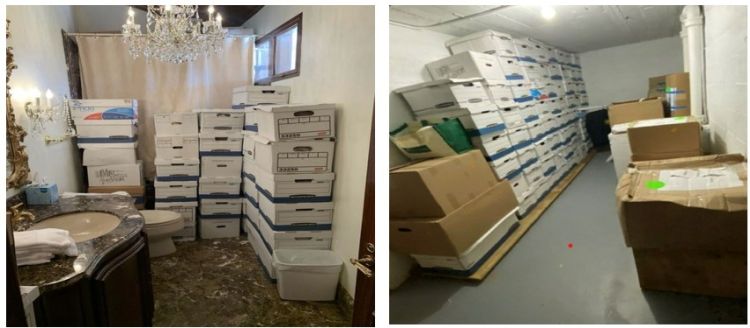
Former FBI analyst going to prison for retaining classified documents at her home, in a case similar to Trump’s

On June 21, a former analyst with the Kansas City Division of the FBI was sentenced in federal court for illegally retaining documents related to the national defense at her residence.
Kendra Kingsbury, 50, of Garden City, Kansas, was sentenced by U.S. District Judge Stephen R. Bough to three years and eight months in federal prison followed by three years of supervised release. Kingsbury had previously pleaded to two counts of unlawfully retaining documents related to the national defense.
Interestingly, her crimes mirror 31 of the 37 counts levied against former president Donald Trump regarding his retaining and mishandling cases upon cases of classified documents stored at his Mar-a-Lago resort.
Trump, who was indicted earlier this month and arraigned last Tuesday, is facing 37 counts ranging from willful retention of classified documents to obstruction in connection with the DOJ’s investigation into his handling of classified documents after leaving office. He is the first former president to face federal charges in United States history. ~ MSN
Related content, see: The few GOP leaders who believe Trump’s classified documents’ indictment is serious
According to court documents, Kingsbury was an intelligence analyst for the FBI for more than 12 years, from 2004 to December 15, 2017. She was assigned to a sequence of different FBI squads, each of which had a particular focus, such as illegal drug trafficking, violent crime, violent gangs and counterintelligence. Kingsbury held a TOP SECRET/SCI security clearance and had access to national defense and classified information.
Training presentations and materials specifically warned Kingsbury that she was prohibited from retaining classified information at her personal residence. Such information could only be stored in an approved facility and container.
Kingsbury admitted that, over the course of her FBI employment, she repeatedly removed from the FBI and retained in her personal residence (at that time in North Kansas City, Missouri) an abundance of sensitive government materials, including classified documents related to the national defense.
In total, Kingsbury improperly removed and unlawfully and willfully retained approximately 386 classified documents in her personal residence. Some of the classified documents she unlawfully removed and kept in her home contained extremely sensitive national defense information. According to court documents, Kingsbury put national security at risk by retaining classified information in her home that would have, if in the wrong hands, revealed some of the government’s most important and secretive methods of collecting essential national security intelligence.
The judge overseeing the case against Kingsbury slammed the former analyst for storing those secret documents in her bathroom. “I cannot fathom why you would jeopardize our nation by leaving these documents in your bathtub,” the judge said.
Kingsbury admitted to investigators that she retained and destroyed other documents over the years that could have contained classified and/or national defense information. The documents retained by Kingsbury in her personal residence included documents in electronic format on hard drives, compact discs and other storage media.
The national defense information that Kingsbury unlawfully retained included numerous documents classified at the SECRET level from the FBI that describe intelligence sources and methods related to U.S. government efforts related to counterterrorism, counterintelligence and defending against cyber threats. These documents included details on the FBI’s nationwide objectives and priorities, including specific investigations across multiple field offices that were open at the time Kingsbury unlawfully retained the documents. In addition, Kingsbury retained documents relating to sensitive human-source operations in national security investigations, intelligence gaps regarding hostile foreign intelligence services and terrorist organizations and the technical capabilities of the FBI against counterintelligence and counterterrorism targets.
The national defense information that Kingsbury unlawfully retained also included numerous documents classified at the SECRET level from another government agency. These documents described intelligence sources and methods related to U.S. government efforts to collect intelligence on terrorist groups. The documents included information about al Qaeda members on the African continent, including a suspected associate of Usama bin Laden. In addition, there were documents regarding the activities of emerging terrorists and their efforts to establish themselves in support of al Qaeda in Africa.
The FBI investigated what uses Kingsbury put to the classified documents she illegally removed from the secure workspace, but according to court documents, the investigation revealed more questions and concerns than answers.
Investigators reviewed Kingsbury’s telephone records, which revealed a number of suspicious calls. Kingsbury contacted phone numbers associated with subjects of counterterrorism investigations, and these individuals also made telephone calls to Kingsbury. Investigators have not been able to determine why Kingsbury contacted these individuals, or why these individuals contacted her. Kingsbury declined to provide the government with any further information.
The FBI Omaha Field Office is still actively investigating the case.
Editorial query, inquiring minds want to know:
Can and will the case against Kingsbury be used as legal precedent in the upcoming case against Donald Trump?
(Source: DoJ) / (Cover photo, Kendra Kingsbury, Image credit: Twitter)
Posted by Richard Webster, Ace News Today / Follow Richard on Facebook, Twitter & Instagram






